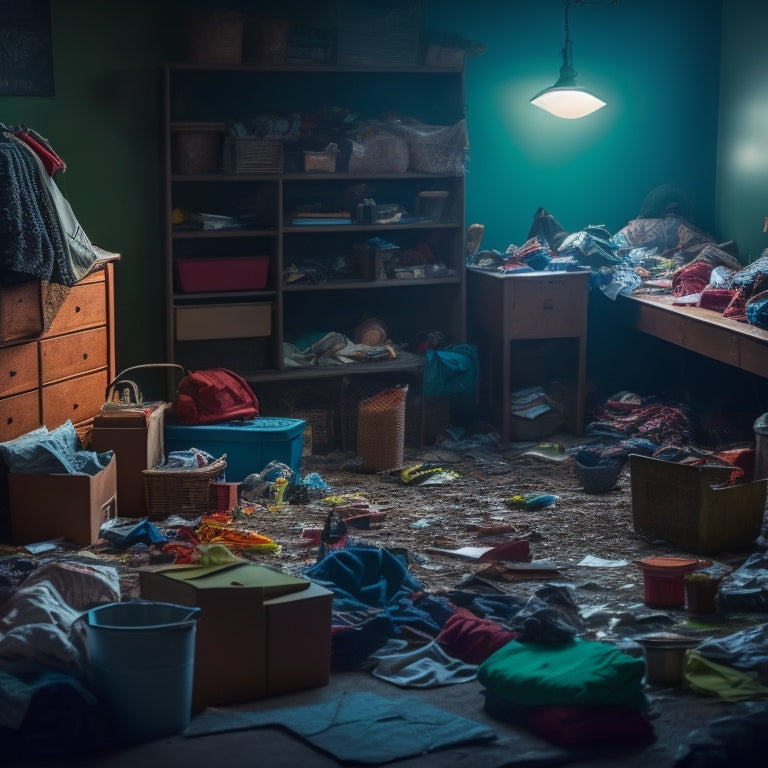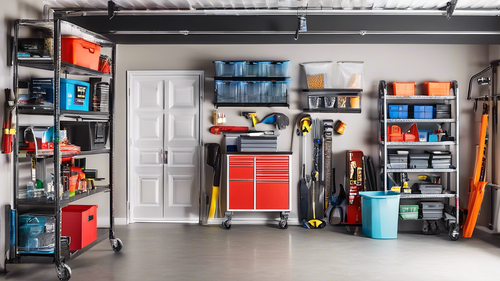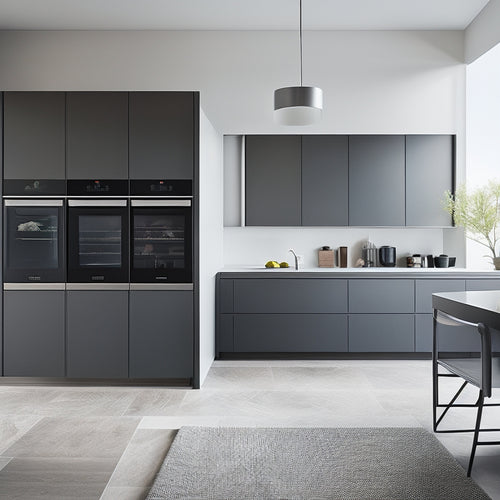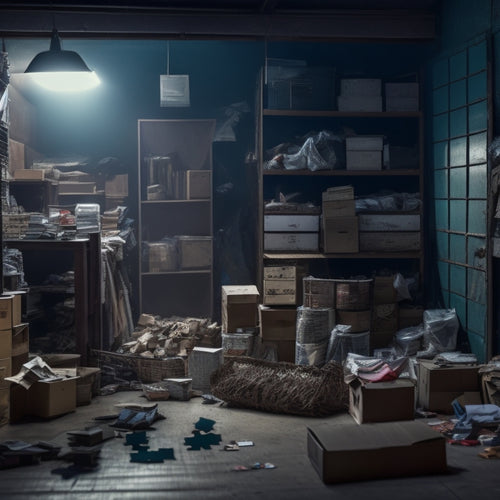
Why Home Organization Fails for Hoarders
Share
You're not alone in struggling to keep your home organized, despite your best efforts. Unrealistic expectations, generic organization systems, and emotional attachments to items often hinder your progress. Inadequate storage planning, insufficient space solutions, and an overwhelming amount of clutter only add to the frustration. What's more, ineffective maintenance strategies and underlying emotional issues can make it difficult to sustain any organizational gains. It's time to acknowledge that traditional approaches might not work for you, and that's okay. By understanding the unique challenges you face, you can begin to uncover customized solutions that address the root causes of your clutter and disorganization - and that's just the starting point.
Key Takeaways
- Unrealistic expectations and lack of emotional readiness hinder home organization success for hoarders, leading to discouragement and burnout.
- Generic organization systems often fail to meet individual needs, ignoring emotional attachments, personal preferences, and unique spatial challenges.
- Inability to let go of items due to emotional attachment, guilt, and fear of losing memories or potential future usefulness is a significant obstacle.
- Insufficient storage space solutions, including limited shelving options and inadequate closet systems, exacerbate clutter issues and hinder relaxation.
- Overwhelming amounts of clutter can evoke anxiety and guilt, making it difficult for hoarders to begin the organization process and maintain progress.
Unrealistic Expectations From the Start
As you stand amidst the clutter, you're likely bracing yourself for a challenging task: tackling the overwhelming chaos that has taken over your living space.
It's crucial to recognize that your emotional readiness plays a significant role in your ability to succeed. Unrealistic timelines can be a significant obstacle, leading to discouragement and burnout.
Adopting a clutter-free mindset and understanding that possessions don't define personal identity can help you approach the task with a clearer viewpoint.
Be honest with yourself about what you can realistically accomplish in a day or a week. Set achievable goals, and prioritize your well-being throughout the process.
Remember, home organization is a process, not a sprint. Focus on progress, not perfection.
Lack of Personalized Organization Systems
You've probably tried a few generic organization systems that promised to change your space, but ultimately fell short.
These one-size-fits-all solutions often ignore your personal preferences, habits, and needs, which can lead to frustration and disappointment.
One-Size-Fits-All Solutions
Because hoarding is a complex issue rooted in emotional and psychological factors, it's no wonder that generic organization systems often fall short. You may have tried systems that promise a one-size-fits-all solution, but they don't account for your unique needs and behavioral triggers. This can lead to frustration and feelings of failure.
| System | Shortcoming | Customized Alternative |
|---|---|---|
| Decluttering apps | Don't address emotional attachments | Work with a therapist to develop coping strategies |
| Pre-made labels | Don't accommodate your personal categorization style | Create customized labels that make sense to you |
| Storage solutions | Don't consider your specific spatial needs | Design a customized storage system that fits your space |
To overcome hoarding, you need customized approaches that acknowledge your unique challenges and triggers. By recognizing the limitations of one-size-fits-all solutions, you can begin to develop personalized strategies that work for you.
Ignoring Personal Preferences
Generic organization systems often overlook the importance of personal preferences, leading to a mismatch between the system and your unique needs. You might be drawn to a particular color scheme or style, but a generic system mightn't accommodate your personal taste. This can make it difficult for you to maintain the system, as it doesn't align with your personal style.
Additionally, an organizational system that doesn't consider your emotional connection to certain items can lead to feelings of guilt or anxiety. It's crucial to create a system that honors your individuality, allowing you to feel comfortable and in control.
Inadequate Storage Planning
Your space is unique, with its own set of challenges and requirements, yet many organizational systems fail to acknowledge these differences. This one-size-fits-all approach often leads to inadequate storage planning, which can hinder your ability to maintain organization.
You need a customized plan that optimizes your space for storage. To achieve this, you must consider spatial planning, taking into consideration the flow of your space and how you use it. This means identifying areas where clutter tends to accumulate and designing storage solutions that address these areas specifically.
Inability to Let Go of Items
One of the most significant challenges people with hoarding tendencies face is the inability to let go of items. You may struggle to part with possessions due to emotional attachment, decision fatigue, or the fear of needing something in the future. This can lead to clutter accumulation and disorganization.
Some common obstacles to letting go include:
- Fear of losing memories or sentimental value
- Believing an item might be useful someday
- Feeling guilty about wasting money or resources
- Uncertainty about how to dispose of an item
- Emotional attachment to gifts or items from loved ones
Insufficient Storage Space Solutions
You're likely no stranger to the frustration of feeling like you're running out of space to store your belongings.
You've probably tried to make do with limited shelving options, inadequate closet systems, and cluttered floor spaces, but it's just not working.
It's time to investigate creative solutions to maximize your storage capacity and create a more peaceful living environment.
Limited Shelving Options
Hindered by clutter, living spaces often feel suffocated by the sheer volume of possessions, making it difficult to pinpoint where to start organizing.
You're not alone in this struggle. Limited shelving options can exacerbate the issue, leaving you feeling overwhelmed and unsure of how to proceed.
Some common obstacles to effective shelving include:
- Inadequate shelving materials that can't support the weight of your belongings
- Limited floor space, making it difficult to add more shelves
- Failure to employ vertical space, resulting in wasted storage opportunities
- Shelving units that are too narrow or too wide for your specific needs
- Inability to customize shelving to fit your unique organizational style
Inadequate Closet Systems
As you struggle to find space to store your belongings, your closets may seem like a logical solution, but often they're just as cluttered and disorganized as the rest of your living space.
You've probably tried using shelves, bins, and other storage containers, but these makeshift solutions only provide temporary relief.
The truth is, traditional closet systems often fall short, failing to accommodate your unique needs and habits.
That's why investing in custom closet solutions can be a transformative solution.
By incorporating multi-functional furniture and customized storage solutions, you can create a space that truly works for you.
This might include features like adjustable shelving, built-in drawers, or specialized compartments for specific items.
With a well-designed closet system, you can finally regain control over your belongings and your space.
Cluttered Floor Spaces
Floor spaces, once intended for relaxation and socializing, have become crowded dumping grounds for your belongings.
You're not alone in this struggle. Cluttered floor spaces can be overwhelming, making it difficult to focus on floor space management and clutter reduction techniques.
To regain control, consider these strategies:
- Start small: Clear a single area, like a coffee table or section of floor, to create a sense of accomplishment and momentum.
- Sort and categorize: Group similar items together to identify what can be kept, donated, or discarded.
- Assign a home: Designate a specific place for each item to maintain order and prevent clutter from building up again.
- Use vertical space: Install shelves or storage units to maximize your floor space and keep belongings organized.
- Create a maintenance routine: Set aside time each week to maintain your newly organized space and prevent clutter from returning.
Overwhelming Amount of Clutter
A staggering number of possessions can suffocate your living space, making it difficult to breathe, think, and function. You're not alone in this struggle. The overwhelming amount of clutter can evoke feelings of anxiety and guilt, making it hard to know where to start.
Emotional attachment to items can create decision fatigue, causing you to procrastinate on decluttering. It's crucial to identify your organizing triggers and develop sustainable habits for clutter management.
Start by evaluating your space and prioritizing areas that cause the most stress. Then, employ decluttering techniques that work for you, such as categorizing items or using the "one in, one out" rule.
Ineffective Maintenance Strategies
While you may have finally decluttered your space, you're likely to fall back into old habits without effective maintenance strategies in place.
To avoid this, focus on establishing routines that promote habit formation. This means:
- Setting aside a specific time each day for tidying up and maintaining your space
- Creating a "one in, one out" policy to prevent clutter from building up again
- Implementing a regular cleaning schedule to keep your home organized and clean
- Assigning a designated spot for each item to guarantee everything has its place
- Creating accountability by sharing your maintenance goals with a trusted friend or family member
Unaddressed Underlying Emotional Issues
Your newly organized space can be a source of satisfaction, but it's important to recognize that clutter often stems from deeper emotional issues. You may feel overwhelmed by the thought of diving into these underlying issues, but it's vital to address them to maintain your newly organized space.
| Emotional Triggers | Therapeutic Approaches | Goals |
|---|---|---|
| Fear of loss or abandonment | Cognitive-behavioral therapy (CBT) | Identify and challenge negative thought patterns |
| Trauma or stress | Mindfulness-based stress reduction (MBSR) | Develop coping mechanisms for emotional regulation |
| Perfectionism or control | Acceptance and commitment therapy (ACT) | Increase self-compassion and flexibility |
| Emotional attachment to items | Psychodynamic therapy | investigate and understand the emotional significance of possessions |
Frequently Asked Questions
Can a Professional Organizer Help Someone With Severe Hoarding Issues?
You can benefit from a professional organizer's guidance, but it's crucial to address the emotional attachment behind your possessions and develop healthy coping strategies before tackling the clutter, ensuring a more successful and sustainable organizing process.
Are There Any Specific Organization Methods for People With Adhd?
You're not alone in struggling to stay organized with ADHD! Try visual organization techniques like color-coding and mind maps to enhance focus. Pair these with time management strategies like Pomodoro timers to elevate productivity and regain control over your space.
How Do I Handle Criticism From Family Members About My Clutter?
When family members criticize your clutter, you feel defensive and hurt. Recognize their concerns, but prioritize your emotional well-being; surround yourself with supportive loved ones, and focus on your progress, not their opinions, to maintain family support and minimize the emotional impact.
Is It Possible to Overcome Hoarding Tendencies Without Therapy?
You can overcome hoarding tendencies without therapy by adopting self-help strategies like gradual decluttering, creating a safe space, and setting realistic goals, but be patient and kind to yourself throughout the process.
Can I Organize My Space Alone, or Do I Need Outside Help?
You can start with self-organization strategies, but having emotional support from a professional organizer or trusted friend can make a huge difference in staying motivated and accountable, helping you achieve your goals.
Related Posts
-

Garage Organization on a Budget: Clever Tips and DIY Solutions
Does your garage resemble a chaotic jumble of forgotten belongings and outgrown equipment? Fear not, garage enthu...
-

Why Optimize Your Kitchen With Hidden Appliances?
By incorporating hidden appliances into your kitchen design, you can convert your cooking space into a sleek, high-en...
-

What's Missing in Your Storage Space Solution?
You're likely overlooking hidden opportunities to optimize your kitchen's storage capacity, leading to inefficiencies...


